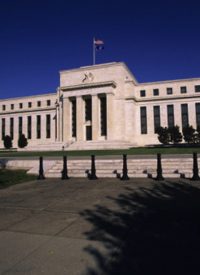
In a remarkable show of both contempt and hubris, the Federal Reserve System announced that it will be celebrating its 100th birthday at exactly the same place where it secretly started, in Jekyll Island, Georgia.
The first meeting was carefully concealed from the public, as attendee Frank Vanderlip, President of National City Bank of New York (representing Rockefeller and Kuhn-Loeb banking interests) noted later:
Despite my views about the value to society of greater publicity for the affairs of corporations, there was an occasion, near the close of 1910, when I was as secretive — indeed, as furtive — as any conspirator…. I do not feel it is any exaggeration to speak of our secret expedition to Jekyll Island as the occasion of the actual conception of what eventually became the Federal Reserve System….
The servants and train crew may have known the identities of one or two of us, but they did not know all, and it was the names of all printed together that would have made our mysterious journey significant in Washington, on Wall Street, even in London. Discovery, we knew, simply must not happen, or else all our time and effort would be wasted. If it were to be exposed publicly that our particular group had got together and written a banking bill, that bill would have no chance whatever of passage by Congress.
In celebrating its “centenary of the 1910 Jekyll Island meeting that resulted in draft legislation for the creation of a U. S. central bank,” it is holding a two-day conference to discuss 1) the origins of the Fed, 2) how closely the Fed has followed its original “mandate,” and 3) what its track record “teaches us about its role going forward.” In a hat-tip to its conspiratorial foundation, the Atlanta Fed’s website admits that the Jekyll Island meeting in November, 1910 was secretly planned by Senator Nelson Aldrich, the chairman of the National Banking Commission:
Over the years, the clandestine nature of the meeting has been criticized as allowing undue Wall Street influence over the founding of the U. S. central bank. However, the meeting itself was just one step in the process that led to the creation of the Federal Reserve. [Emphasis added.]
The conference taking place this weekend follows the announcement of “QE2” (Quanitative Easing), the now permanently ongoing monthly attempt to reflate the economy with money created out of nothing. Chairman Ben Bernanke, who is chairing the conference, wrote in the Washington Post:
Not withstanding the progress that has been made [by the Fed] … we could hardly be satisfied. The Federal Reserve’s objectives … are to promote a high level of employment and low, stable inflation…
The FOMC [Federal Open Market Committee] decided this week that, with unemployment high and inflation very low, further support to the economy is needed.
Once that decision was made and announced, the chairman then left for the celebration off the coast of Georgia along with former Chairman Alan Greenspan and presidents of various branches of the Fed from Atlanta, Philadelphia, Cleveland, St. Louis, and Dallas. On the roster of presenters are various economics professors and Gerald Corrigan, managing director of Goldman Sachs and former president of the Federal Reserve Bank of New York.
The Fed is considered to have more power over the economy than even the Congress. In commenting on the new financial regulation bill, Rep. Ron Paul (R-Texas) said, “The regulations [in this bill] should be on the Federal Reserve. We should have transparency of the Federal Reserve. They can create trillions of dollars to bail out their friends, and we don’t even have any transparency of this. They’re more powerful than the Congress.”
The Daily Bell noted that the meeting is in distinctly bad taste, given the timing of the announcement and the continuing flow of bad economic news that drove the decision by the FOMC to do more of what hasn’t worked so far. But because of the power of the Internet, the Fed faces increasing pressure to disclose its behavior, especially now that Rep. Paul appears to be headed to chair the House monetary committee that oversees the Fed.
One hundred years ago, the Fed was spawned in a secret meeting of bankers and Wall Street financiers. Without the Internet and thousands of bloggers and investigators exposing the machinations and imminent destruction of the currency as a result of Federal Reserve policies, the 100th birthday of that meeting would most likely also be taking place in secret.



